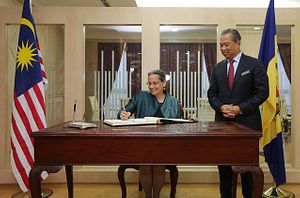This week, Malaysia’s home minister, Muhyiddin Yassin, paid a visit to the United States. While the agenda of his trip was wide-ranging, it nonetheless spotlighted in particular the counterterrorism aspect of the wider U.S.-Malaysia relationship that has been gaining traction over the past few years despite the wider challenges in bilateral ties that remain.
As I have observed before in these pages, while U.S. and Malaysian counterterrorism approaches differ in some significant ways and aspects of U.S. foreign policy in the Middle East – such as the lingering memories of wars in Iraq and Afghanistan following the September 11 attacks – remain deeply unpopular in Muslim-majority Malaysia, the issue has nonetheless been among the growing areas of U.S.-Malaysia security cooperation in the past few years.
Particularly during the time when U.S. President Barack Obama and Prime Minister Najib Razak had held office, Malaysia had initially emerged as a key partner for the United States in the struggle against the Islamic State within their wider comprehensive partnership forged in 2014. Malaysia was one of the few Asian countries that was part of the U.S.-led Global Coalition to Counter ISIL, and bilateral collaboration had been underway in several areas as the United States sought to counter terrorism and radicalism and Malaysia dealt with several plots and rising concerns about returning fighters from the Middle East.
While changing leaderships on both sides and differences over wider foreign policy questions have complicated ties since then, counterterrorism remains a shared priority. Indeed, as Malaysia’s Pakatan Harapan (PH) government has looked to both manage existing security challenges as well as make new changes to Malaysia’s defense orientation since coming to power in a shock election in May 2018, counterterrorism has been among the areas to watch within the evolution of the broader U.S.-Malaysia relationship.
This week, this aspect of U.S.-Malaysia relations was in the headlines again with the visit of Home Minister Muhyiddin Yassin to the United States. Muhyiddin – a former deputy prime minister during the Najib government who now also heads the Bersatu party that formed the opposition coalition to oust Najib in the 2018 elections – was on an official visit to the United States which included stops in Washington D.C. and New York, where, apart from his own engagements there, Malaysia will also be participating in deliberations tied to the UN General Assembly, to include the attendance of Malaysian Prime Minister Mahathir Mohamad.
Muhyiddin’s weeklong visit itself, with official interactions lasting from September 14 to September 21, consisted of a series of engagements, which included the U.S. Terrorism Screening Center, Homeland Security, the Federal Bureau of Investigation, the Central Intelligence Agency, the Attorney General’s office, and the New York Police Department. The engagements touched on a range of security-related issues of interest to Malaysia and his portfolio, including human trafficking, immigration, and issues tied to the management of the 1MDB corruption scandal.
Unsurprisingly, of particular note was the emphasis on counterterrorism – a key issue for Malaysia amid continuing concerns about terrorist groups domestically as well as returning foreign fighters from the Middle East. For instance, Malaysia’s national news agency Bernama noted that there were discussions about the sharing of U.S. approaches, with a case in point being the use of the Automated Targeting System-Global (ATS-G) offered by the U.S. Custom and Border Protection to Malaysia. There was also mention of U.S. law enforcement experience that Malaysia could leverage for some of the measures that have been previously floated domestically, including the use of body cameras for security personnel and changes to how government agencies deal with immigration issues, which can also overlap with terrorism-related matters as well.
To be sure, how these discussions and sharing of experiences translate into reality remains to be seen. And there remain challenges for advancing U.S.-Malaysia defense collaboration as well. For instance, as Muhyiddin told Bernama, despite talk dating back years on a visa waiver program for Malaysia, initially tied to certain security-related issues, this still remains far from being a reality. Issues such as human trafficking also continue to be matters for both sides to manage on an ongoing basis, with the annual spotlight on Malaysia among the countries in the State Department’s Trafficking in Persons (TIP) report.
More broadly, even as issue-specific collaboration continues to advance in U.S.-Malaysia relations such as terrorism, this has occurred in the absence of engagement between Mahathir and Trump themselves and as differences have been compounded in other areas. While this is not an unfamiliar dynamic in U.S.-Malaysia relations – we saw this dynamic at play to a certain extent during parts of Mahathir’s initial tenure as prime minister as well – the point is that it can impose a ceiling on where security collaboration can reach. This and other aspects of the bigger picture in U.S.-Malaysia relations will be important to keep in mind even as we see inroads made in individual engagements including Muhyiddin’s visit to the United States this week.

































